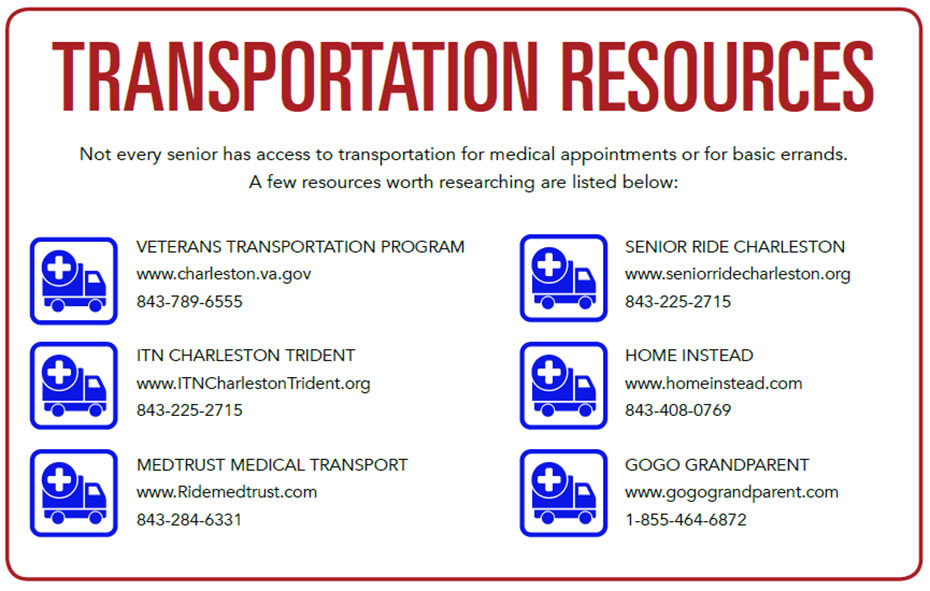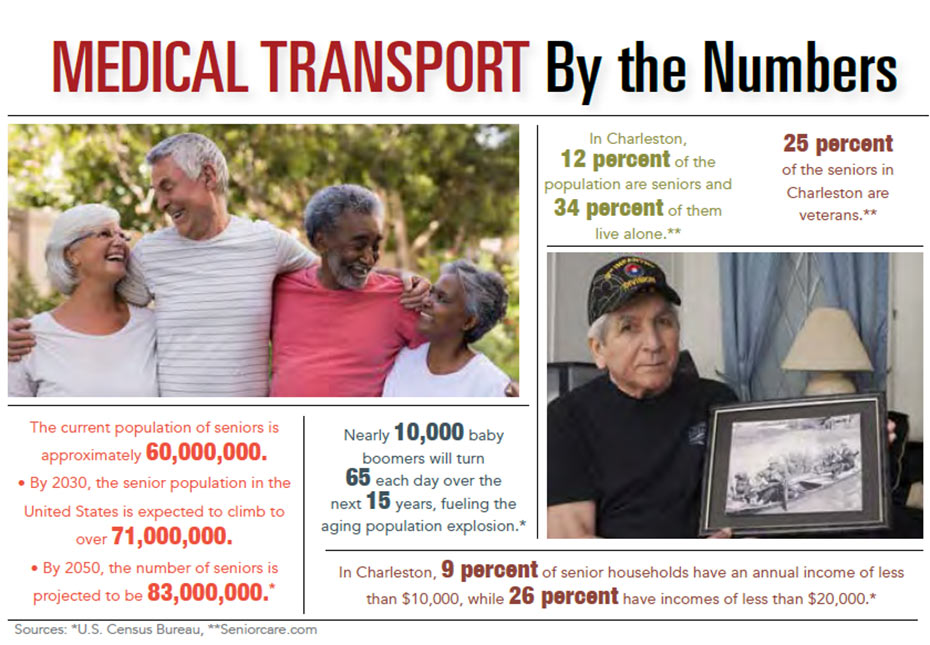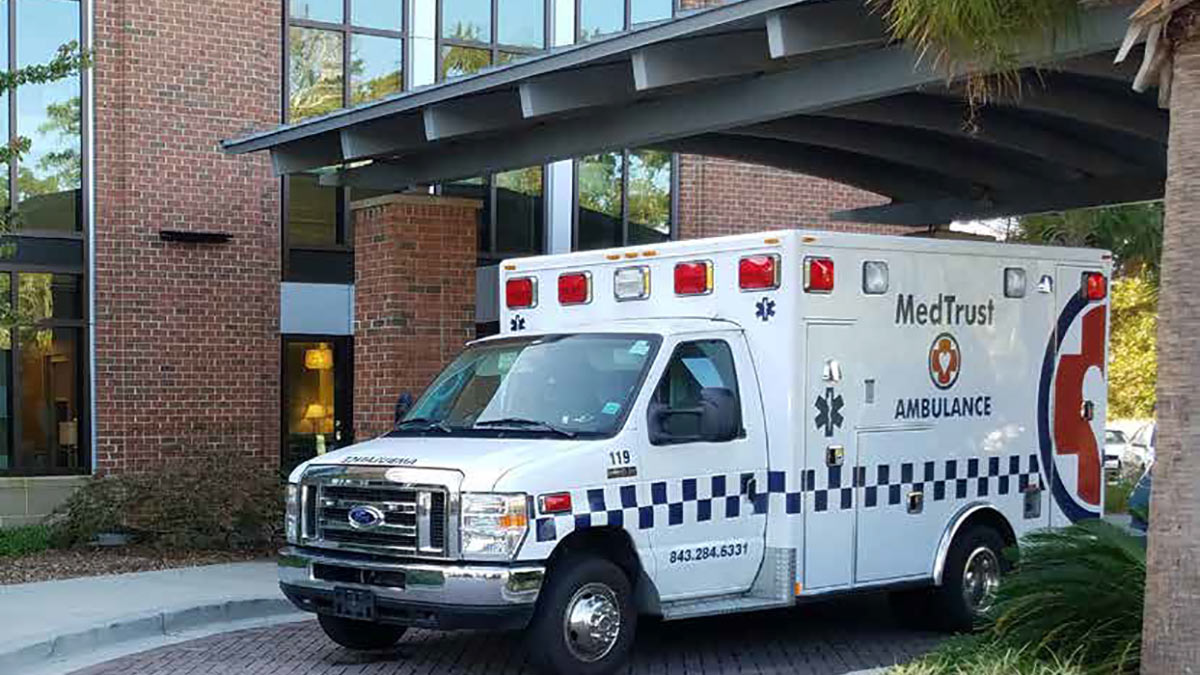Given that a fourth of Charleston’s senior citizens are veterans, it’s hard to wrap your head around the logistics behind providing them with transportation to medical appointments. When you factor in that the service area reaches far beyond Charleston, Berkeley and Dorchester counties and into rural areas, the importance of having a well-oiled system becomes obvious.
Josh Watts, CEO and founder of MedTrust Medical Transport, knows all too well the roadblocks experienced by senior citizens who need help getting to their appointments. “We have a fast-growing market of retirees,” said Watts, “but we don’t have a ton of medical-related transport. People in nursing homes can usually get transportation, but a large segment of the senior population is strapped financially and doesn’t qualify for Medicaid. They end up paying 100 percent out-of-pocket for a taxi or an Uber, meaning that they could easily spend $50 getting to and from an appointment with a driver who has no medical training. That rider won’t receive curb-to-curb medical assistance.”
Last year, the VOLUNTEER TRANSPORTATION NETWORK dispatched 105 volunteer drivers who transported more than 9,000 patients, traveling over 320,000 miles to get them to their appointments. Clearly, the demand is high for volunteers and donations. Those who want to volunteer to drive should call 843-789-7230.
For the staff at the VA Medical Center’s Veterans Transportation Service, providing rides for veterans ranging from those who are without a vehicle to those who are visually impaired, elderly or suffering from disease or disabilities is all in a day’s work.
According to the VTS website, veterans who are eligible for VA health care benefits and have a VA-authorized appointment are eligible for transportation through the VTS program, based on availability and the guidelines in place at their local facility.
In fact, the VTS has established a comprehensive system for getting veterans to and from their appointments safely – thanks to a network of dedicated employees, volunteers and donors. They also work closely with the VA’s Office of Rural Health and numerous other organizations.
According to Jeff Vollum, chief, health administration service at the Department of Veterans Affairs in Charleston, the VA manages to provide a full range of services, even though resources are limited, often necessitating creative approaches to solving problems.
“It’s not always easy,” Vollum said, “but we do whatever it takes to make things work.”
The mode of transportation depends largely on the medical needs and condition of the patient. There are specific transportation options for those who have numerous medical issues, are wheelchair-bound or require ambulance transport to the VA or to a private care provider. It’s a rules-based program that sometimes operates on doctors’ notes and instructions. But not every veteran requires transportation in an ambulance – many just need a ride.
For those patients, this is where volunteers step up. According to Fred Lesinski, chief of community engagement and veteran experience at the Ralph H. Johnson VA Medical Center, any veteran seeking assistance visiting a VA facility or a non-VA facility such as a dialysis clinic will have transportation to get there.
“The spirit of the program is to eliminate hurdles for veterans in terms of transportation,” said Lesinski.
The Veterans Transportation Program also provides, at little or no cost, transportation to VA health care facilities through its Beneficiary Travel Program. Pre-approved transportation solutions, arrangement of special mode transportation at the request of the VA and bus, taxi, airline or train transportation are options under certain circumstances.
In addition, through its Highly Rural Transportation Grants program, funds are provided to veterans’ service organizations and state veterans’ service agencies. The grants, which are available only in counties with fewer than seven people per square mile, provide transportation to VA and non-VA care in rural areas.
Any veteran in need of transportation services should call 843-789-6555 for information. As Vollum said: “We work miracles here every day.”
For the private sector, with the exception of the services provided by a few volunteer organizations, the need for transportation is huge, especially for those who aren’t ambulatory. Watts said that while many seniors have housing and assets on paper, the reality of their situation is quite different. With no Medicaid benefits, they end up riding on multi-load buses if they’re ambulatory or wheelchair-bound. “This is a problem since a chemo or dialysis patient doesn’t need to be sitting on a bus for hours,” Watts said. “Our industry, as a whole, is very fragmented.”
But Watts is passionate about his patients who need ambulance transport due to serious health issues. He works in partnership with his patients to cut through the governmental red tape, to get them to where they need to go. “I never give up when eligibility is denied by insurance. I keep going back until I find a solution. The idea that transport is covered only if a patient is having an emergency is penny-wise and pound-foolish. They won’t cover transportation, but they’ll cover a five-day stay in ICU when it could all have been prevented,” Watts said.
By Sharon Gnau









